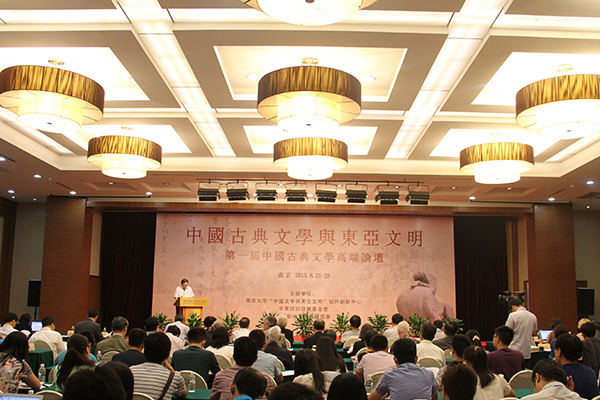Classical literature studies involve modern perspectives

The first High-level Classical Chinese Literature Forum is held from Aug. 22 to 23 in Nanjing.
At a recent forum in Nanjing, scholars said modern perspectives should be applied to the research of classical literature.
With the theme “Classical Chinese Literature and East Asian Civilizations,” the first High-level Classical Chinese Literature Forum, held from Aug. 22 to 23, gathered more than 50 scholars from over 30 reputed universities and research institutions in China and abroad to discuss such issues as classical Chinese literature and culture, the influence of Chinese books written by foreigners, and the relationship between ancient Chinese literature and East Asian civilizations.
Literature: Vehicle for ideas
“There must be ideas and value orientations in literary works,” said Mo Lifeng, a senior professor of humanities and social sciences at Nanjing University, adding that literature will be meaningless unless it carries ideas.
Chen Guanghong, a professor from the Institute of Ancient Books Collation and Studies at Fudan University, said: “the ‘ideas’ are not about ‘natural laws,’ but pertain to social ethics and order. Only with “ideas” can a literary work be positioned clearly and gain traction.”
“Classical Chinese poems, in essence, are personal lyrics. A good poem must be a direct expression of its author’s feelings,” Mo said.
Using renowned Tang Dynasty poet Du Fu (712-770) as an example, Mo said that Du’s poetry is reflective of history and full of spiritual power, presenting a noble character to readers.
Chinese cultural legacy on the world
“By comparing gigaku, an extinct genre of masked drama-dance performance in Japan, with folk songs and ballads composed from the Han Dynasty (206 BC-AD 220) to the Six Dynasties period (420-589), we can see that the former absorbed Chinese cultural elements,” said Ge Xiaoyin, a professor from the Department of Chinese Language and Literature at Peking University.
Choe Yongchui, a professor of Chinese studies at Korea University, shed light on literary development in ancient Korea. In the Confucianism-dominated Kingdom of Joseon (1392-1897), traditional men of letters were critical of novels, but things gradually changed after the 16th century, he said.
In the mid-16th century, court officials came to accept the Popular Romance of the Three Kingdoms and put it into movable metal type printing, thereby spreading it widely across the country. Into the 18th century, more Chinese novels were imported and embraced by the ruling class. With social changes and literary development, novels progressively permeated the mainstream of popular literature. Imported novels of the Ming (1368-1644) and Qing (1616-1911) dynasties made the outside world known to Koreans and to some extent, bred national consciousness among them, Choe said.
In the meantime, classical Chinese poetry began its journey to the West, arriving in France first and then expanding out to the entire Western world.
Qian Linsen, a professor from the School of Liberal Arts at Nanjing University, attributed the introduction of classical Chinese poetry to France to the rise of French Sinology and translations by missionaries and Sinologists in China.
Modern perspectives necessary
Attending scholars agreed that studying classical Chinese literature from modern perspectives is not only fundamental to the research of Chinese literature but is also an important step toward better organizing excellent traditional Chinese cultural resources, strengthening China’s cultural soft power, discussing contemporary Chinese literature and innovating Chinese culture.
“When studying how Chinese literature evolves from traditional to modern, it is not acceptable to overlook the modernity of classical poetry,” said Lin Tsung-Cheng, a professor from the Department of Pacific and Asian Studies at the University of Victoria in Canada.
The evolution of Chinese literature from classical to modern has long been a focus of research on modern literature. However, there has been a preference for works of the period from the late Qing Dynasty to the early Republican era and a preference for novels. In fact, poetry was the major literary form in classical Chinese literature. Classical poets, whichever dynasty they were in, were familiar with the tradition of classical poetry and cared about innovation, Lin said.
Wang Guanglu is a reporter at the Chinese Social Sciences Today.
